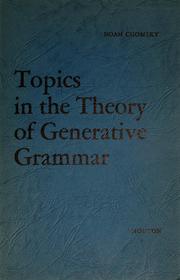Buy this book

Editorial Reviews
From the Author
In this essay I have been discussing topics in linguistic theory from a point of view which is in most respects quite traditional, but which has been given new life and scope in recent work. I have also tried to show that this traditional view must be adopted, in its essentials, if linguistic research is to progress and to provide understanding of significant questions. There are value judgments here, of course; I have tried, here and in the references mentioned previously, to justify those that underlie the work I have been reviewing.
This work has been based on the assumption that competence must be distinguished from performance if either is to be seriously studied. It has, beyond this, attempted to provide an explanatory theory of competence, and to use this as a basis for constructing an account of performance. The theory of competence is mentalistic, naturally, in that it can at the present stage of knowledge draw no evidence from and make no direct contribution towards the study of the mechanisms that may realize the mental structures that form the subject matter for this theory, or that carry out the mental processes that it studies. Thus the theory of competence (i.e. the theory of grammar) deals with abstract structures, postulated to account for and explain linguistic data.
Certain aspects of the theory of grammar seem reasonably well established today. The abstract character of underlying (deep) structure in both syntax and phonology is hardly open to question, and there are interesting general conclusions that can be drawn from this fact (see p. 38, n. 11). The role of grammatical transformations in syntax and phonology seems hardly disputable, in the light of present information, and the role of distinctive features in syntax and phonology also seems to be firmly established. There is also little doubt that the rules relating abstract underlying structures to surface forms, in syntax and phonology, are ordered either linearly or cyclically in many or perhaps all parts of the grammar.
Nevertheless, it goes without saying that any theory of grammar that can be formulated today must be highly tentative. Many questions remain totally open, many partially so. In general, the empirical assumptions about the form of language that can currently be formulated will undoubtedly be refined and improved, and, no doubt revised in essential ways as new critical evidence accumulates and deeper theoretical insights are achieved. Changes in linguistic theory are inevitable in coming years. In short, linguistics is a living subject.(Amazon.com)
Buy this book

Previews available in: English
| Edition | Availability |
|---|---|
|
1
Topics in the Theory of Generative Grammar
January 1978, Walter De Gruyter Inc, De Gruyter Mouton
Paperback
in English
9027931224 9789027931221
|
zzzz
|
| 2 |
zzzz
|
| 3 |
zzzz
|
| 4 |
aaaa
|
| 5 |
zzzz
|
Book Details
Edition Notes
Bibliography: p. [93]-95.
"This monograph consists of the text of four lectures delivered at the Linguistic Institute of the Linguistic Society of America, held at Indiana University, June 1964."
Classifications
The Physical Object
Edition Identifiers
Work Identifiers
Community Reviews (0)
| February 13, 2020 | Edited by MARC Bot | remove fake subjects |
| September 14, 2019 | Edited by J.B. | Edited without comment. |
| January 26, 2012 | Edited by EdwardBot | add books to in library lending |
| October 27, 2011 | Edited by EdwardBot | remove duplicate author |
| October 16, 2009 | Created by WorkBot | add works page |
















